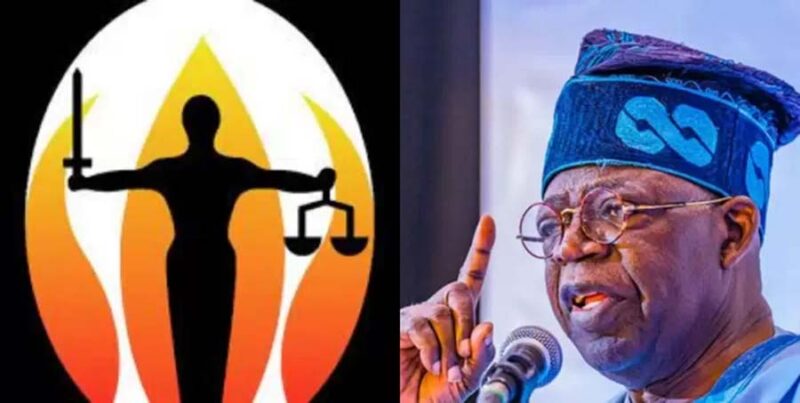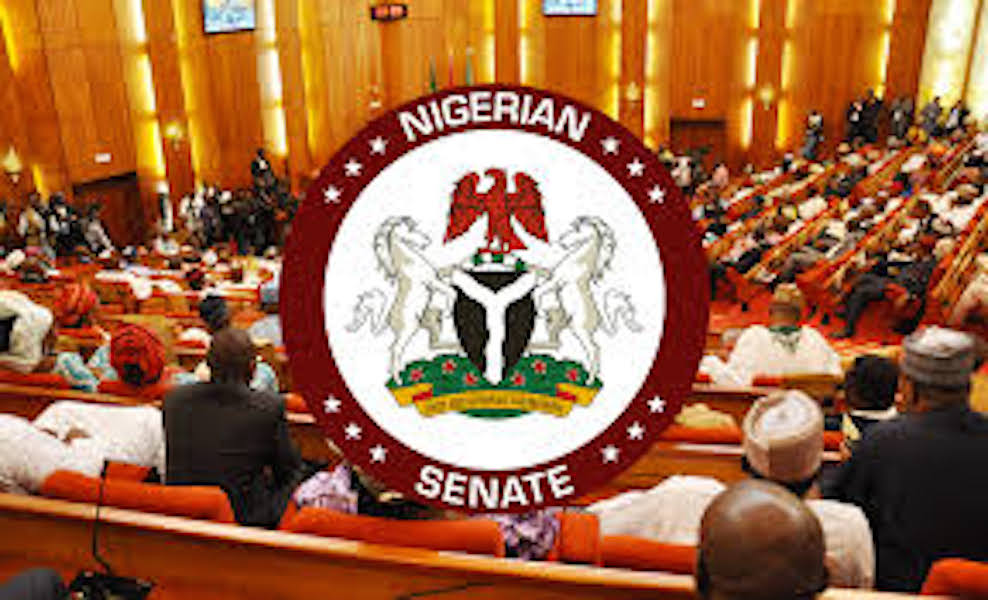News
Reverse petrol price hike, probe NNPC, SERAP tells Tinubu

Reverse petrol price hike, probe NNPC, SERAP tells Tinubu
Socio-Economic Rights and Accountability Project (SERAP) has urged President Bola Tinubu to use his “leadership position and good offices to direct the Nigerian National Petroleum Company Limited (NNPCL) to immediately reverse the apparently illegal and unconstitutional increase in the pump price of premium motor spirit (PMS), also known as petrol, across its retail outlets.”
SERAP urged him to “direct the Attorney General of the Federation and Minister of Justice Mr Lateef Fagbemi, SAN, and appropriate anti-corruption agencies “to probe the allegations of corruption and mismanagement in the NNPC, including the spending of the reported $300 million ‘bailout funds’ collected from the Federal Government in August 2024, and the $6 billion debt it owes suppliers, despite allegedly failing to remit oil revenues to the treasury.”
SERAP said, “Suspected perpetrators of alleged corruption and mismanagement in the NNPC should face prosecution as appropriate, if there is sufficient admissible evidence, and any proceeds of corruption should be fully recovered.”
In the open letter dated 7 September 2024 and signed by SERAP deputy director Kolawole Oluwadare, the organisation said: “The increase in petrol price constitutes a fundamental breach of constitutional guarantees and the country’s international human rights obligations.”
SERAP said, “Nigerians have for far too long been denied justice and the opportunity to get to the bottom of why they continue to pay the price for corruption in the oil sector.”
The letter, read in part: “Rather than pursuing public policies to address the growing poverty and inequality in the country, and holding the NNPC to account for the alleged corruption and mismanagement in the oil sector, your government seems to be punishing the poor.
“The increase in petrol price has rendered already impoverished citizens incapable of satisfying their minimum needs for survival.”
“The increase is not inevitable, as it stems from the persistent failure of successive governments to address allegations of corruption and mismanagement in the oil sector and the impunity of suspected perpetrators.”
READ ALSO:
- U20 Women W’Cup: Falconets cruise past Venezuela, make last 16
- Nigeria’s daily petrol consumption rises from 30m litres to 60m – NMDPRA
- Lagos chiefs enforce monarch’s price reduction order in community market
“Corruption in the oil sector and the lack of transparency and accountability in the use of public funds to support the operations of the NNPC have resulted in persistent and unlawful hike in petrol prices.”
“Holding the NNPC to account for alleged corruption and mismanagement in the oil sector would serve legitimate public interests.”
“The increase is causing immense hardship to those less well-off. We are concerned that as the economic situation in Nigeria deteriorates, the increase in petrol price is pushing people further into poverty.”
“We would be grateful if the recommended measures are taken within 48 days of the receipt and/or publication of this letter. If we have not heard from you by then, SERAP shall consider appropriate legal actions to compel your government to comply with our request in the public interest.”
“Increasing petrol prices at a time when millions of Nigerians continue to face worsening economic conditions is entirely inconsistent with your government constitutional and international obligations to ensure the minimum living conditions compatible with human dignity.”
“The arbitrary increase has placed a disproportionate burden on the marginalized and most vulnerable sectors of society, particularly those disadvantaged by poverty.”
“The increase is seriously jeopardizing their living conditions, well as individuals’ physical, emotional, and individual development, and intensifying and worsening socioeconomic conditions in the country.”
“The increase constitutes a serious human rights problem because of the intensity with which it undermines the enjoyment and exercise by Nigerians of their human rights and renders their civic participation illusory.”
“The fundamental right to life includes not only the right of every Nigerian not to be deprived of his/her life arbitrarily, but also the right that he/she will not be prevented from having access to the conditions that guarantee a dignified existence.”
“The growing poverty and inequality in the country has continued to adversely affect the right of Nigerians to participatory democracy, and impede their ability to participate in their own government.”
READ ALSO:
- Another 196 soldiers reportedly quit Nigerian Army
- Opay, Moniepoint, others begin FG levy on transactions above N10,000 tomorrow
- Power belongs to God, Otti replies Deputy Speaker Kalu over 2027 Imo gov poll
“Persistent increase in petrol prices keep people in poverty which in turn perpetuates discriminatory attitudes and practices against them.”
“Your government has a legal obligation to mobilize the maximum of the country’s available resources to ensure people’s socio-economic rights and to protect the most vulnerable and disadvantaged Nigerians.”
“Your government also has the legal obligations to probe and prosecute allegations of corruption and mismanagement in the NNPC, and to ensure access to justice and effective remedies for victims of corruption.”
“Investigating and prosecuting allegations of corruption and mismanagement in the oil sector would be entirely consistent with the Nigerian Constitution, and the country’s international anti-corruption obligations.”
“Section 13 of the Nigerian Constitution 1999 [as amended] imposes clear responsibility on your government to conform to, observe and apply the provisions of Chapter 2 of the constitution. Section 15(5) imposes the responsibility on your government to ‘abolish all corrupt practices’ including in the NNPC.”
“Under Section 16(1) of the Constitution, your government has a responsibility to ‘secure the maximum welfare, freedom and happiness of every citizen on the basis of social justice and equality of status and opportunity.’”
“Section 16(2) further provides that, ‘the material resources of the nation are harnessed and distributed as best as possible to serve the common good.’”
“According to our information, the Nigerian National Petroleum Company (NNPC) Limited recently increased the price of premium motor spirit (PMS), also known as petrol, across its retail outlets.”
“The price of the product increased to N855 per litre, from about N600, and in some instances above N900 per litre. The apparently unlawful increase in petrol price followed a scarcity caused by the reported refusal by suppliers to import petroleum products for the NNPCL over a $6 billion debt.”
“The NNPC reportedly failed to remit USD$2.04 billion and N164 billion of oil revenues into the public treasury, as documented in the recently published 2020 annual report by the Auditor-General of the Federation.”
Reverse petrol price hike, probe NNPC, SERAP tells Tinubu
News
Senate Explains Why Real-Time E-Transmission Cannot Be Mandatory in 2027 Elections

Senate Explains Why Real-Time E-Transmission Cannot Be Mandatory in 2027 Elections
The Nigerian Senate has defended its decision to make electronic transmission of election results discretionary rather than mandatory in the ongoing amendment to the Electoral Bill 2026, insisting the move is grounded in data, infrastructure realities and legislative responsibility — not political sentiment.
The controversy centres on Clause 60(3) of the proposed amendment, which originally stated that a presiding officer “shall electronically transmit the results from each polling unit to the INEC Result Viewing Portal (IReV) in real time.”
After debate, lawmakers retained electronic transmission but removed the mandatory “real time” requirement, introducing a caveat that where internet connectivity fails, Form EC8A — the official manual result sheet — will serve as the primary basis for collation.
Senate: Decision Based on Empirical Data
Leader of the Senate, Opeyemi Bamidele, clarified the chamber’s position in a statement issued through his Directorate of Media and Public Affairs, stressing that lawmaking “comes with huge obligations globally” and cannot be driven by emotion.
According to Bamidele, the Senate consulted stakeholders in the telecommunications and energy sectors before revising the clause. He said the decision reflects the “stark realities” of Nigeria’s communications and power infrastructure.
READ ALSO:
- Osun PDP Lawmakers Endorse Tinubu for 2027, Back Adeleke Re-Election
- MACBAN Rejects Terrorism Allegations, Warns Against Stigmatisation
- Customs Seize Cocaine Worth N1bn Along Nigeria–Benin Corridor
Key Data Cited by the Senate
- Nigeria recorded about 70% broadband coverage in 2025, but actual internet penetration stood at roughly 44.53% of the population, according to figures from the Nigerian Communications Commission.
- The Speedtest Global Index ranked Nigeria 85th out of 105 countries in mobile network reliability and 129th out of 150 countries in fixed broadband reliability.
- In the power sector, approximately 85 million Nigerians lack access to grid electricity, representing about 43% of the population.
- Although generation capacity fluctuates between 12,000 and 13,500 megawatts, only around 4,500 megawatts are typically delivered nationwide.
Bamidele argued that making real-time electronic transmission mandatory under such conditions could create operational bottlenecks, trigger disputes and potentially destabilise the electoral process, particularly in rural communities with weak connectivity.
“By global standards, real-time electronic transmission of election results may not be practicable at this stage of our development,” he said.
What the Amendment Means
The revised clause does not abolish electronic transmission of results. Instead, it provides flexibility in implementation.
The Senate maintains that Section 62(2) of the Electoral Act 2022 already establishes a National Electronic Register of Election Results, and the amendment aims to reinforce the framework without creating a rigid mandate that may prove impractical nationwide.
Under the current system operated by the Independent National Electoral Commission (INEC):
- Results are entered into Form EC8A at the polling unit.
- The presiding officer uses the BVAS device to upload a scanned copy to the IReV portal.
- The portal allows public viewing of polling unit results for transparency.
READ ALSO:
- Security Row: El-Rufai Accuses Ribadu of Procuring Dangerous Chemicals
- Singer Market Fire: Tinubu Sends Shettima, FG Delegation to Kano
- Omokri Alleges Possible Hacking in Obi–Oyedepo Audio Leak, Mentions el-Rufai
The Senate’s revision would allow uploads to remain in place, but without invalidating results in areas where connectivity prevents immediate transmission.
Opposition and Public Backlash
The decision has sparked significant debate across Nigeria’s political landscape.
Former presidential candidate Peter Obi and former Rivers State governor Rotimi Amaechi have criticised the move, arguing that weakening mandatory real-time uploads could undermine electoral transparency and public trust ahead of the 2027 general elections.
Civil society groups and election observers warn that introducing a “network failure” clause may create loopholes that could be exploited during collation, particularly at ward and local government levels.
However, supporters of the Senate’s position argue that insisting on a strict real-time requirement without adequate infrastructure could lead to widespread technical failures, contested results and post-election instability.
House–Senate Differences and Next Steps
The House of Representatives is understood to favour retaining the mandatory real-time transmission language, setting the stage for a conference committee to harmonise both versions of the bill.
The final wording of Clause 60(3) will likely shape Nigeria’s electoral governance framework heading into 2027 and determine whether real-time electronic transmission becomes a statutory obligation or remains subject to operational discretion.
As debates intensify, the issue has become a defining test of Nigeria’s commitment to electoral reform — balancing technological ambition with infrastructural reality.
Senate Explains Why Real-Time E-Transmission Cannot Be Mandatory in 2027 Elections
News
Osogbo Sons and Daughters Mark 5th Anniversary with Awards, Political Undertones

Osogbo Sons and Daughters Mark 5th Anniversary with Awards, Political Undertones
The 5th anniversary celebration of Osogbo Sons and Daughters drew prominent indigenes, political office holders, traditional leaders and stakeholders to a colourful gathering focused on the development of Osogbo, the Osun State capital.
Members of the Osogbo United Youth Forum were also in attendance at the event, which featured the presentation of meritorious awards to distinguished sons and daughters of the town in recognition of their contributions to community growth.
Among the award recipients were the member representing Osogbo Federal Constituency in the House of Representatives, Alhaji Moruf Adewale Gangari; the Secretary to the Osun State Government, Alhaji Teslim Igbalaye; and the member representing Osogbo in the Osun State House of Assembly. Others honoured included the Chief Executive Officer of Mars Filling Station, Alhaji Eniafelamon, the Head Baale of Osogbo, as well as several other eminent indigenes.
The awards, according to the organisers, were aimed at appreciating individuals who have demonstrated dedication and service toward the advancement of Osogbo.
The Osun State Governor, Ademola Adeleke, who was represented at the event by the Commissioner for Information, Kolapo Alimi, used the occasion to stress the importance of collective support for the administration ahead of the August 8 governorship election.
READ ALSO:
- Check Your Name: UNILORIN Releases Updated NELFUND Refund List for 2024/2025 Students
- Troops Arrest Suspected Gunrunner, Recover Six Machine Guns in Taraba Operation
- Argungu Festival 2026 Highlights Peace, Stability, Economic Growth — Tinubu
In his address, the commissioner noted that Osogbo and Ile-Ife are strategically positioned in ongoing political discussions concerning succession politics toward 2030. He stated that the town which records the highest number of votes in the forthcoming election could stand a stronger chance of producing the governor’s successor in 2030.
He also highlighted developmental projects executed by the present administration in Osogbo and urged residents to remain united in order to attract more dividends of democracy to the town.
Speaking earlier, the Secretary to the State Government, Alhaji Teslim Igbalaye, outlined several initiatives he said he had facilitated for Osogbo through his office. According to him, over 100 indigenes of Osogbo have secured employment opportunities since the inception of the current administration.
He added that arrangements were at an advanced stage for more Osogbo indigenes to occupy principal officer positions across tertiary institutions in the state. Igbalaye promised to provide the leadership of Osogbo Sons and Daughters with the names and phone numbers of beneficiaries to ensure transparency and verification.
He also pledged to donate a bus to the association, following a request by its President, Saheed Akinyemi.
The programme further provided an avenue for elected representatives from Osogbo to present their scorecards before the audience, promoting accountability and engagement with constituents.
In his closing remarks, the President of Osogbo Sons and Daughters commended dignitaries and participants for their presence and reiterated the organisation’s commitment to the continued progress and unity of Osogbo.
Osogbo Sons and Daughters Mark 5th Anniversary with Awards, Political Undertones
News
Afenifere Calls for Immediate Take-Off of State Police as Terror Threats Rise in Yorubaland

Afenifere Calls for Immediate Take-Off of State Police as Terror Threats Rise in Yorubaland
The pan‑Yoruba socio-political group Afenifere has warned that escalating terrorist attacks in states bordering the South-West are heightening fears of a full-scale incursion into Yorubaland, calling on governors to urgently implement robust security measures and push for the take-off of state police.
In a statement by its National Publicity Secretary, Jare Ajayi, Afenifere expressed deep concern over repeated attacks in Kwara, Kogi, and Niger states, as well as kidnappings in Ondo, Ekiti, and Oyo states. The group cited the recent Woro and Nuku attacks in Kwara State, where nearly 200 people were reportedly killed and several others abducted, as a warning of the growing threat.
“This is a very disturbing development as cases of abduction seem to be on the increase in Yorubaland. Terror acts are no longer confined to rural areas; even cities like Ibadan have witnessed incidents,” the statement read. Afenifere highlighted the broad-daylight abduction of a schoolgirl in Ibadan’s Challenge area as a chilling example of the insecurity affecting urban centres.
Ajayi urged governors of the six South-West states — Oyo, Ogun, Osun, Ekiti, Ondo, and Lagos — as well as neighbouring states including Kwara, Kogi, Edo, and Delta, to implement practical security arrangements that will allow residents to “sleep with their two eyes closed.”
READ ALSO:
- CAF Confirms 2027 AFCON Dates, Reveals Host Cities, Stadiums Across East Africa
- Ronaldo Returns From Absence to Score in Al‑Nassr’s 2‑0 Win Over Al‑Fateh
- One Dead as Hausa, Benue Communities Clash at Port Harcourt Market
The group recalled that during a November 24, 2025, meeting in Ibadan, the South-West governors had agreed to strengthen regional security through measures such as the South-West Security Fund and the creation of monitoring centres to track potential terrorist activity. Afenifere noted that recent steps, such as Ogun State’s inauguration of CCTV monitoring centres, are commendable but insufficient.
Ajayi stressed that the persistence of banditry and terrorism is not due to a lack of intelligence, but rather the failure to effectively utilize available information. He insisted that state police should take off immediately, while communities must be empowered to develop local security arrangements, including support for the Amotekun Corps and other regional security initiatives.
“It is high time governors in Yorubaland went beyond sermonisation and swung into decisive actions that will make the region truly secure,” Ajayi said.
Afenifere’s warning comes amid growing concerns over security across southern Nigeria, where the spread of banditry, kidnappings, and terrorist attacks is increasingly threatening both rural and urban communities. The group’s call reinforces longstanding advocacy for state-level policing as a critical measure to combat rising insecurity.
Afenifere Calls for Immediate Take-Off of State Police as Terror Threats Rise in Yorubaland
-

 Education15 hours ago
Education15 hours agoCheck Your Name: UNILORIN Releases Updated NELFUND Refund List for 2024/2025 Students
-

 News6 hours ago
News6 hours agoOsogbo Sons and Daughters Mark 5th Anniversary with Awards, Political Undertones
-

 metro3 days ago
metro3 days agoLagos Police Launch Manhunt for Suspect in Brutal Ajah Murder
-

 News3 days ago
News3 days agoAso Rock Goes Solar as Tinubu Orders National Grid Disconnection
-

 metro1 day ago
metro1 day agoBoko Haram Terrorists Release Video of 176 Abducted Kwara Residents
-

 metro1 day ago
metro1 day agoWoman Arrested Over Murder of Nigerian E-Hailing Driver in South Africa
-

 Sports3 days ago
Sports3 days agoLookman Shines as Atlético Madrid Hammer Barcelona 4-0
-

 News17 hours ago
News17 hours agoAfenifere Calls for Immediate Take-Off of State Police as Terror Threats Rise in Yorubaland













